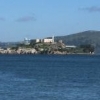One of the problems I have with the "fish Oil is bad for you" or "Omega 3's are bad for you" is that the Omega 3 content of the game meat we were likely to have evolved on was likely to be high.
http://www.bisonbasi...d_finished.html
I'm basing this on the assumption that the wild game we ate did not graze on grain but grasses, which were more plentiful.
So our membranes not containing these fatty acids in at least 4:1 ratio or higher would be a rare condition, and not one that our body systems were adapted to.
Fish Oil seems to lower inflammation, improve blood fatty acid profiles, and be somewhat anti-tumor
http://www.ncbi.nlm..../pubmed/8569432
At nutritiondata.com, which at least seams like an unbiased source, in that they don't sell any particular food items, "
game meat" bison, which sounds like it must be grass fed by definition, has a decent n-6:n-3 ratio of 3.7 if you trim off all the fat, so you're just eating visibly lean meat. However, the omega 3 fatty acids it contains are PUFA (2, 3, or 4 double bonds, with none of it in the HUFA (highly unsaturated FA) form, like EPA and DHA. Further, per ounce, you get less than a tenth of a gram of PUFAs of all kinds, so the fat from this particular form of game meat has a very low oxidation risk, being mostly SAFA and MUFA. The oxidation risk of a given fatty acid increases exponentially with each added double bond, so there is no comparison between game meets and fish oil, which has five (EPA) and six (DHA) double bonds.
If you eat the fat, grass fed bison has a worse 6:3 ratio. They said that a 3oz serving of cooked ground meat contained 38.2mg n-3 and 266mg n-6. That's a 6:3 ratio of 7. Still a very low PUFA level, though, and no HUFA.
In reasonable doses, fish oil is anti-inflammatory and a great thing. Here's the anti-tumor link you posted:
Lipids. 1995 Nov;30(11):1035-45.
Dietary menhaden oil enhances mitomycin C antitumor activity toward human mammary carcinoma MX-1.
Shao Y, Pardini L, Pardini RS.
Allie M. Lee Laboratory for Cancer Research, Department of Biochemistry, University of Nevada, Reno 89557, USA.
In the present study, we investigated the effects of high levels of dietary fish oil on the growth of MX-1 human mammary carcinoma and its response to mitomycin C (MC) treatment in athymic mice. We found that high levels of dietary fish oil (20% menhaden oil + 5% corn oil, w/w) compared to a control diet (5% corn oil, w/w) not only lowered the tumor growth rate, but also increased the tumor response to MC treatment. We also found that high levels of dietary fish oil significantly increased the activities of tumor xanthine oxidase and DT-diaphorase, which are proposed to be involved in the bioreductive activation of MC. Since menhaden oil is highly unsaturated, its intake caused a significant increase in the degree of fatty acid unsaturation in tumor membrane phospholipids. This alteration in tumor membrane phospholipids made the tumor more susceptible to oxidative stress, as indicated by the increased levels of both endogenous lipid peroxidation and protein oxidation after feeding the host animals the menhaden oil diet. In addition, the tumor antioxidant enzyme activities, catalase (CAT), superoxide dismutase (SOD), glutathione peroxidase (GPOx), and glutathione S-transferase peroxidase (GSTPx), were all significantly enhanced by feeding a diet high in fish oil. MC treatment caused further increases in tumor lipid peroxidation and protein oxidation, as well as in the activities of CAT, SOD, GPOx, and GSTPx, suggesting that MC causes oxidative stress in this tumor model which is exacerbated by feeding a diet high in menhaden oil. Thus, feeding a diet rich in menhaden oil decreased the growth of human mammary carcinoma MX-1, increased its responsiveness to MC, and increased its susceptibility to endogenous and MC-induced oxidative stress, and increased the tumor activities of two enzymes proposed to be involved in the bioactivation of MC, that is, DT-diaphorase and xanthine oxidase. These findings support a role of these two enzymes in the bioactivating of MC and indicate that the type of dietary fat may be important in tumor response to therapy.
PMID: 8569432
In this paper, fish oil is kind of a chemotherapy agent, damaging all cells, but helping the mitomycin C (toxin) to selectively kill tumor cells by raising the level of oxidative stress. I'd say that was an argument for high dose fish oil if you're also undergoing mitomycin C chemotherapy, but otherwise, it looks like a negative.
Fish oil is great in low doses; I take 2 grams a day of a typical (non-concentrated) fish oil. I just don't think that the available data supports megadosing it.















































